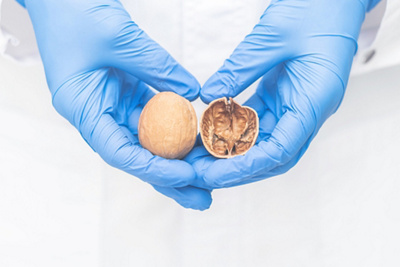Prostate cancer (prostate carcinoma) is a malignant disease that affects the prostate (prostate gland). It primarily affects men over the age of 50. With increasing age, the greater the probability of developing prostate cancer. The treatment depends on how far the prostate cancer has progressed and the patient’s age. Given that prostate cancer usually grows very slowly, men diagnosed at the age of 70 or older frequently do not need any treatment.

What is prostate cancer?
Prostate cancer is the most common type of cancer among men and the second most deadly. Prostate tumours develop predominantly in men over the age of 50. In general, this type of cancer grows very slowly, but tends to metastasise (i.e., the tumour spreads to other parts of the body). The earlier a prostate tumour is detected and treated, the greater the chances of recovery.
The prostate (prostate gland) is located below the bladder and surrounds the urethra. The gland produces a secretion that is expelled together with sperm during ejaculation. As men grow older, their prostate often becomes enlarged. This benign prostate enlargement results in similar symptoms to those caused by prostate cancer, but it should not be confused with cancer.
Causes of prostate cancer
The exact reasons why prostate cancer develops are still largely unknown. Men with a family history of prostate cancer (among first-degree relatives) have an increased risk of developing the disease. In addition, there are indications that high meat and alcohol consumption may also increase the risk of disease.
Symptoms of prostate cancer
The following symptoms may be an indication of prostate cancer. However, more often than not, they only cause a benign enlargement of the prostate.
- Frequent need to urinate
- Weak urine stream
- Pain during urination
- Blood in the urine
- Blood in the semen.
Early detection and diagnosis
Regular check-ups are recommended for men aged 50 and over to detect prostate cancer early. The earlier prostate cancer is detected, the greater the chances of recovery. During the screening examination, the prostate is palpated through the rectum, and a prostate specific antigen test (PSA test) is performed.
If the prostate cancer examination reveals an enlarged prostate and an elevated PSA level in the blood, this may be an indication of a tumour. Further examinations are necessary because the PSA value and the size of the prostate can also be influenced by factors other than a tumour. Magnetic resonance imaging (MRI) of the prostate gland is used to identify abnormal areas. Prostate cancer can only be definitively diagnosed when a tissue sample is taken (biopsy). The requisite tissue is removed through the perineal skin under a short anaesthetic.
Treatment of prostate cancer
Prostate cancer treatment is determined on an individual basis and depends on the size of the tumour, the stage of the cancer and the age and health of the patient. Prostate cancer usually grows slowly, so the years of life gained through treatment should be weighed against the loss of quality of life due to the consequences of treatment.
Conservative treatment: Long-term observation and active monitoring
Small tumours that have not yet spread beyond the prostate are often just actively monitored. That way, surgery can often be delayed for many years without affecting the patient’s chances of survival. Treatment is only started when the tumour causes discomfort or the patient wants treatment.
Surgical treatment: Radical prostatectomy
An operation is required if the tumour starts to grow into the surrounding tissue, or it is an aggressive, rapidly growing tumour. Thanks to modern surgical procedures, complications that can occur after the operation – such as erectile dysfunction and urinary incontinence – have become less frequent.
You can find out more about the surgical treatment options in the prostate surgery section.
Radiation, chemotherapy and hormone therapy
Prostate tumours that have already formed other tumours (metastasised) or grown into the surrounding tissue can be treated with radiotherapy , chemotherapy or anti-hormone therapy.
Our centres
-
Prostate Cancer Centre Klinik St. Anna
Available by telephone from Monday to Friday 09.00 - 11.30 h and 13.30 - 16.00 h
-
Tumor centre Bern
Monbijoustrasse 10
3011 Bern -
Tumour Centre Klinik St. Anna
Available by telephone from Monday to Friday 09.00 - 11.30 h and 13.30 - 16.00 h
-
Urology Centre Hirslanden Lucerne
Klinik St. AnnaSt. Anna-Strasse 32 6006 Lucerne



